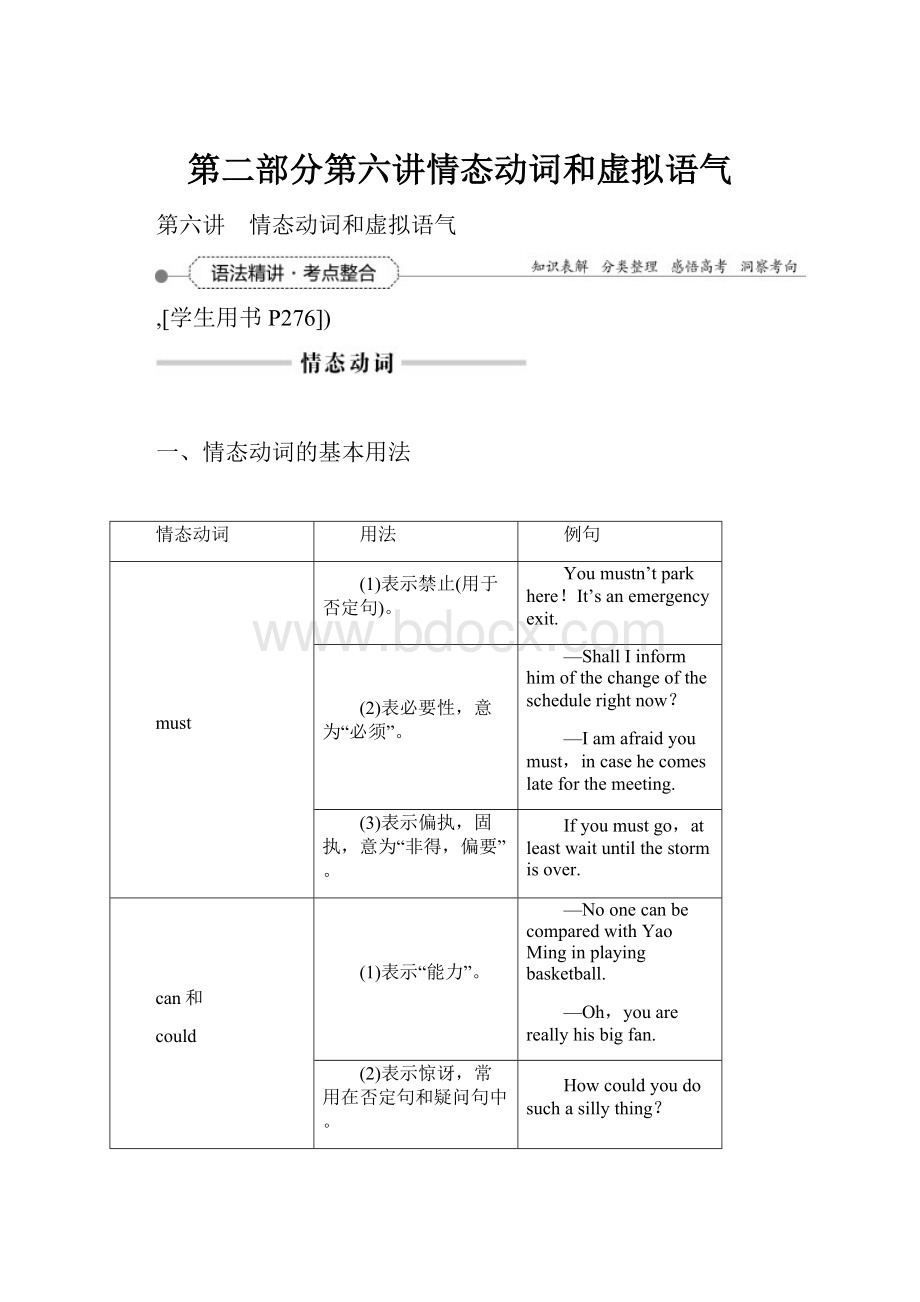第二部分第六讲情态动词和虚拟语气.docx
《第二部分第六讲情态动词和虚拟语气.docx》由会员分享,可在线阅读,更多相关《第二部分第六讲情态动词和虚拟语气.docx(16页珍藏版)》请在冰豆网上搜索。

第二部分第六讲情态动词和虚拟语气
第六讲 情态动词和虚拟语气
[学生用书P276])
一、情态动词的基本用法
情态动词
用法
例句
must
(1)表示禁止(用于否定句)。
Youmustn’tparkhere!
It’sanemergencyexit.
(2)表必要性,意为“必须”。
—ShallIinformhimofthechangeoftheschedulerightnow?
—Iamafraidyoumust,incasehecomeslateforthemeeting.
(3)表示偏执,固执,意为“非得,偏要”。
Ifyoumustgo,atleastwaituntilthestormisover.
can和
could
(1)表示“能力”。
—NoonecanbecomparedwithYaoMinginplayingbasketball.
—Oh,youarereallyhisbigfan.
(2)表示惊讶,常用在否定句和疑问句中。
Howcouldyoudosuchasillything?
(3)表示礼貌地请求别人做某事,意为“能,可以”。
—Thisdishisreallydelicious.CouldyoupleasesayitinChinese?
—Sure,wecallit“doufu”.
(4)cannot...too/
enough表示“无论……也不过分”;“越……越好”。
Youcan’tbetoocarefulwhiledriving.
shall
(1)用于第一、第三人称疑问句中,表示说话人征求对方的意见和向对方请示。
ShallIgooutforawalkaftersupper?
(2)用于第二、第三人称陈述句中,表示说话人给对方的命令、警告、允诺或威胁。
—Willyoureadmeastory,Mummy?
—OK.Youshallhaveoneifyougotobedassoonaspossible.
may和
might
(1)may和might表示“许可”、“可能性”、“祝愿”等意义。
—MayItakethisbookoutofthereadingroom?
—No,youmustn’t.Youmustreaditinhere.
(2)“mayaswell+动词原形”意为“最好,倒不如”。
Ifyouthinkthepriceofbeefistoohigh,youmayaswellbuysomepork.Itdependsonyou.
will
和would
(1)表示意志、意愿和决心。
①—Whydidn’tyoucometoSimon’spartylastnight?
—Iwantedto,butmymomsimplywouldnotletmeoutsolateatnight.
②Ihavetoldhimagainandagaintostopsmoking,buthewillnotlisten.
(2)will可以表示一种习惯的动作,有“总是”或“总要”之意。
Everymorninghewillhaveawalkalongthisriver.
(3)would可以表示过去的习惯动作,比usedto正式,但没有“现已无此习惯”的含义。
Whenweworkedinthesamefirmseveralyearsago,wewouldoftengotothecinematogether.
二、情态动词表推测
情态动词
用法
例句
must
must表示推测时只能用于肯定句中,意为“一定,必定”,表示十分肯定的语气(在疑问句中或否定句中要用can/could)。
—It’stheoffice!
Soyoumustknoweatingisnotallowedhere.
—Oh,sorry.
can
(1)can用于肯定句中表示客观的可能性,意为“有时会”;
(2)用于疑问句中可以表示推测,意为“可能”,有时表示一种惊讶的语气;
(3)用于否定句中也可以表示推测,can’t意为“不可能”,语气很强烈。
①ItisusuallywarminmyhometowninMarch,butitcanberathercoldsometimes.
②Mr.Bushisontimeforeverything.Howcanitbethathewaslateforthemeeting?
③(2013·高考安徽卷)Itcouldn’tbethevocabularythatcausedyoutheproblemintheexercisebecauseyouknowalotofwords.
may/
might
(1)may/might用于肯定句中可以用来表示不十分肯定的推测,意为“有可能”;
(2)用于否定句中也可以表示推测,maynot意为“可能不”,表示一种不太确定的语气。
(2013·高考北京卷)—Youneedn’t
takeanumbrella.Itisn’tgoingtorain.
—Well,Idon’tknow.Itmightdo.
should
should用来表示推测时意为“应该”,即含有“按道理来说应当如此”的意思。
Thereshouldn’tbeanydifficultyaboutpassingtheroadtestsinceyouhavepracticedalotinthedrivingschool.
三、情态动词+havedone
情态动词+
havedone
用法
例句
must
havedone
表示对过去已经发生的行为进行推测,意为“一定做了某事”。
Harryisfeelinguncomfortable.Hemusthavedrunktoomuchatthepartylastnight.
may/might
havedone
表示对过去已发生行为的推测,意为“也许/或许已经(没有)……”。
一般用于肯定句或否定句中。
Sorry,I’mlate.Imighthaveturnedoffthealarmclockandgonebacktosleepagain.
can...have
done/cannot
havedone
表示对过去发生的行为的怀疑和不肯定,通常用在否定句和疑问句中。
(can换成could时语气较委婉)
①Ican’tfindhimanywhere.Wherecanhehavegone?
②Theboycan’thavefinishedreadingthebooksosoonbecauseitisdifficulteventoanadult.
couldhave
done
本来能够而没有做
(2014·高考福建卷)Hecouldhavegoneonregrettingit,astoomanyofusdo.
mighthave
done
表示本来可能……,但实际上没有发生的事情。
Youshouldnotswiminthatsea.Youmighthavebeeneatenbyashark.
should/ought
tohavedone
(1)用于肯定句时,表示本该做某事而实际上未做;
(2)用于否定句时,则表示不该做的事反而做了。
①Youshouldn’thavedoneitsocarelessly.
②Yououghttohavereturnedthebookearlier.
③Yououghtnottohaverefusedhisoffer.
needn’t
havedone
表示做了本来不必去做的事,“没必要做而做了”。
温馨提醒 didn’tneedtodo表示“没必要做而实际上也没有做某事”。
①Youneedn’thavebroughtthebookbecauseTomhasonehere.
②Ididn’tneedtobuythedictionary.Ihadacopyathome.
一、if条件从句中的虚拟语气
类别
用法
例句
if引导的条件从句
与现
在事
实相
反
从句谓语动词:
过去式(be用were)
主句谓语动词:
should/would/could/might+动词原形
Sorry,Iamtoobusynow.IfIhadtime,Iwouldcertainlygoforanoutingwithyou.
与过
去事
实相
反
从句谓语动词:
had+过去分词
主句谓语动词:
should/would/could/might+have+过去分词
Ifithadnotrainedsohardyesterdaywe
couldhaveplayedtennis.
与将
来事
实相
反
从句谓语动词:
过去式/were+不定式/should+动词原形
主句谓语动词:
should/would/could/might+动词原形
Gracedoesn’twanttomovetoNewYorkbecauseshethinksifsheweretolivethere,shewouldn’tbeabletoseeherparentsveryoften.
if引导的条件从句的倒装
如果在表示虚拟语气的条件句中含有were,had或should,可将if省略,然后将were,had或should移至主语之前。
Hadwemadeagreateffortwemighthavesucceeded.(=Ifwehadmadeagreateffort...)
混合条
件句的
虚拟语
气
有时条件句的动作与主句动作发生的时间不一致,这时动词的形式应根据它们表示的时间加以调整。
(2013·高考天津卷)IfhehadspentmoretimepractisingspeakingEnglishbefore,hewouldbeabletospeakitmuchbetternow.
二、虚拟语气在名词性从句中的应用
类别
用法
例句
宾语
从句
demand,suggest,order,insist后接的从句中动词为“(should+)动词原形”。
Teachersrecommendparentsnotallowtheirchildrenunder12toridebicyclestoschoolforsafety.
wish后的从句中的谓语可用一般过去时、过去完成时和should/would+动词原形,它们分别表示与现在、过去和将来情况相反。
—Howmuchoftheforeignexpert’sspeechhaveyouunderstood?
—Nexttonothing.IwishIhadworkedharderatEnglish.
主语
从句
在“Itisnecessary/important/strange/suggested/demanded/ordered/requested+that从句”中,从句中的谓语动词用should+动词原形。
①Itisstrangethatsuchapersonshouldbeourfriend.
②Itissuggestedthatthemeeting(should)beputofftillnextweek.
表语
从句
和同
位语
从句
在suggestion,proposal,order,plan,idea,request,advice等名词后的表语从句和同位语从句中要用虚拟语气,其构成是“should+动词原形”,should可以省略。
①Myideaisthatwe(should)thinkitoverbeforeacceptingit.
②Weallagreedtohissuggestionthatwe(should)gotoDalianforavisit.
①(2013·高考浙江卷)Eyedoctorsrecommendthatachild’sfirsteyeexambeattheageofsixmonthsold.
眼科医生建议孩子第一次视力检查应该在六个月大的时候进行。
②(2013·高考陕西卷)Mymomsuggeststhatweshouldeatoutforachangethisweekend.
我妈妈建议这个周末出去吃饭,换换口味。
三、其他句型中的虚拟语气
类别
用法
例句
It’stime
that...
Itis(high)time
(that)...句型中谓语动词用一般过去时或should+动词原形。
Jackisagreattalker.It’shightimethathedid/shoulddosomethinginsteadofjusttalking.
wouldrather
wouldrather所接的从句中的谓语动词用一般过去时(对现在虚拟)或者过去完成时(对过去虚拟)。
Iwouldratheryoustayedathomenow.
ifonly
ifonly后面的谓语动词常用一般过去时(对现在虚拟)、过去完成时(对过去虚拟)与过去将来时(对将来虚拟),表示强烈的愿望。
Ifonlyourdreamhadcometrue!
asif
asif引导的状语从句中动词可以用过去时或过去完成时表示虚拟。
Don’thandlethevaseasifitweremadeofsteel.
四、含蓄条件句的虚拟语气
有时假设的情况并不以条件从句表示,而是由otherwise,but,or,without,butfor等来引导。
①IwouldhavecomesoonerbutIdidn’tknowthattheywerewaitingforme.
我本该早一些到,但我不知道他们在等我。
②(2015·杭州五校联考)—Butforyourtimelywarning,wewouldhavegotintogreattrouble.
——要不是你及时警告,我们也许已经陷入麻烦中了。
—Well,youknowwe’refriends.
——好了,你知道我们是朋友啊。
[学生用书P274])
Ⅰ.从下面方框中选择恰当的情态动词填空
can;could;may;might;must;shall;should;will;would;need
1.(2014·高考湖南卷)—I’vepreparedallkindsoffoodforthepicnic.
—Doyoumeanwe____________(not)bringanythingwithus?
答案:
needn’t
2.(2014·高考大纲全国卷)Althoughyou________________findbargainsinLondon,it’snotgenerallyacheapplacetoshop.
答案:
can
3.(2014·高考重庆卷)I’veorderedsomepizza,sowe____________(not)worryaboutcookingwhenwegethometired.
答案:
needn’t
4.(2013·高考江西卷)WhenIwasachild,I____________watchTVwheneverIwantedto.
答案:
could
5.(2013·高考湖南卷)He____________(not)sleep,althoughhetriedto,whenhegotonsuchahuntforanideauntilhehadcaughtit.
答案:
couldn’t
6.Wecan’timaginethattwochildren____________bekilledbythewashingmachineoftheirhouse!
答案:
should
7.—They__________(not)havearrivedalready.
—Howcanyoubesosure?
It’sonlyafewminutes’ride.
答案:
can’t
8.—Hasyourfriendpassedthetest?
—Sorry,I’mnotsure.He____________have.Ihaven’theardfromhimfortwoweeks.
答案:
might
9.—Thedeadlineisdrawing,butIfailedtochallengethetaskathirdtime.
—____________mybrotherhaveatry?
答案:
Shall
10.Jack,look!
Everybodyisdoinghomeworkquietly.____________youmakeanoiseinclass?
答案:
Must
11.—Who____________itbethatleftthedoorunlocked?
—ItmightbeMike.Heisalwaysforgettingthings.
答案:
could
12.Whenyouarriveatthefrontdoor,youwon’tneedakeybecausethedoor____________openwithatouchofyourfinger.
答案:
will
13.—Schoolisover.HowcanwecontactRobert?
—Tryphoninghim.He____________behomebynow.Helivesonlyastone’sthrowfromtheschool.
答案:
should
14.—HasPeterstartedout?
Hesaidhewouldgohikingwithus.
—He____________havestarted.Heisamanofhisword.
答案:
must
15.WhenIwaslittleandsomethingawfulwashappening,mymum____________tellmetoclosemyeyes.
答案:
would
16.—Jackisthirtyminuteslate.What____________havehappenedtohim?
—I’mnotsure.Hemayhavemissedthebus.
答案:
can
17.MissSmith____________beworkingnow,forthelightsinherofficearestillon.
答案:
must
18.—Kate,whereisJimthesedays?
—Heaskedforasickleavetheotherday.He____________stayinhospital.
答案:
might
19.Iknowyou’rebusy,but____________thisbeanexcusefornotgoingbackhometoseeyourparents?
答案:
can
20.—Thetaxidriveristoblamefortheseriousaccident.
—Ican’tagreemore.He____________(not)havedrunk.
答案:
shouldn’t
Ⅱ.用所给动词的虚拟语气形式填空
1.(2014·高考湖南卷)IfMr.Dewey____________(be)present,hewouldhaveofferedanypossibleassistancetothepeoplethere.
答案:
hadbeen
2.(2014·高考福建卷)____________(be)therenomoderntelecommunications,wewouldhavetowaitforweekstogetnewsfromaroundtheworld.
答案:
Were
3.(2014·高考浙江卷)Theywereabroadduringthemonthswhenwewerecarryingouttheinvestigation,orthey____________(come)toourhelp.
答案:
wouldhavecome
4.(2014·高考陕西卷)Wewouldratherourdaughter____________(stay)athomewithus,butitisherchoice,andsheisnotachildanylonger.
答案:
stayed
5.(2014·高考安徽卷)Peoplearerecyclingmanythingswhichthey____________(throw)awayinthepast.
答案:
wouldhavethrown
6.(2013·高